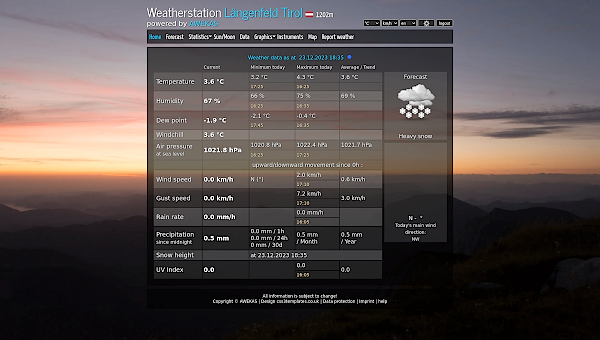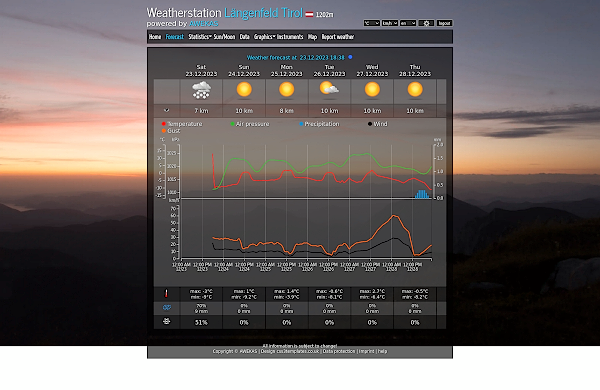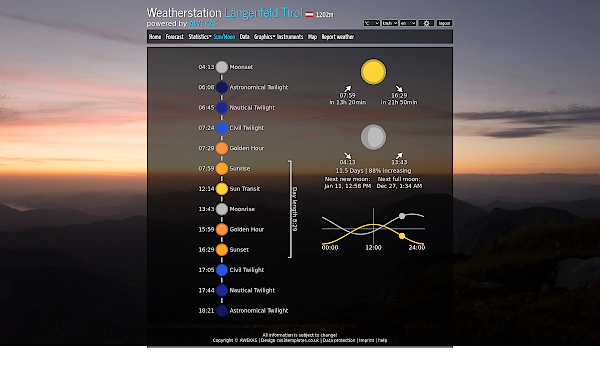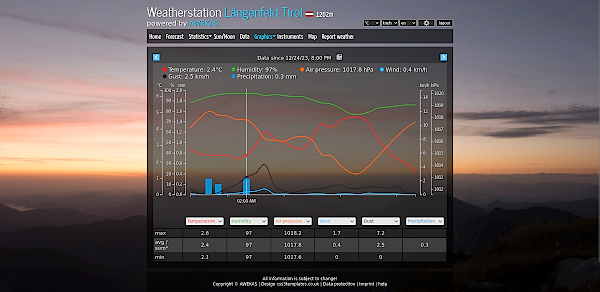12 KiB
| title | summary | date | lastmod | categories | tags | ||||||||
|---|---|---|---|---|---|---|---|---|---|---|---|---|---|
| Bye Netatmo – welcome Ecowitt | I'm totally done with Netatmo at this point and I am more than happy to show you my new setup at my home. I'll start with a [WS69](https://shop.ecowitt.com/products/ws69?variant=41418884743330) (all-in-one) sensor and the Gateway [GW1100](https://shop.ecowitt.com/products/gw1100?variant=41418887987362). Combined with WeeWX we will publish our data to some online weather networks/services. | 2023-12-26T14:06:19+0100 | 2023-12-26T13:27:34+0000 |
|
|
Finally. I've seen this coming for a long time but I didn't want to remove the "somewhat pricey" Netatmo stuff1 just like it costs nothing.
"Luckily" the weather station wasn't able to get actual data from their servers and a complete re-installation (with fresh api keys) didn't resolve the problem. Also some manual requests from my computers (yep, I used two with different operating systems) weren't able to obtain any data through their API.
That was finally the point where I decided to remove this shit stuff. And some
outdoor cameras will follow as well, when I have found new and affordable hardware.
I'm somewhat looking towards Axis.
The following article describes my new weather station setup at home but I wrote this down nearly two weeks after the installation and I might forgot something -- read this with a grain of salt.
Installation of the gateway
This is super easy, there is a temperature and humidity sensor with a ~70 cm long cable (and a ~1 m USB cable, which I don't use). I plugged the gateway into my Raspberry Pi 4 directly and finished the setup on my smartphone. I won't cover this here, the process is really super easy and straightforward.
I will continue with the main software, the logic of most personal weather stations: WeeWX.
Installation of WeeWX on the Raspberry Pi 4
As a little sidenote, I am using the testing branch of Debian, which is Debian GNU/Linux trixie/sid at the moment.
First off, a database is needed
I use a MySQL database for the weather data which should be installed before we connect WeeWX to a database.
$ sudo apt install mariadb-server
$ sudo mysql_secure_installation
$ mysql -uroot -p
Login with the new password and create the necessary users and databases. I will name them both weewx.
You can also use graphical management software to manage your mysql databases, but you would need to secure your installation yourself.
$ sudo apt-get install phpmyadmin
That would also pull in a whole lot of packages like PHP.
{{< alert >}} Don't allow access from the internet to your management software! {{< /alert >}}
As I had a backup of my old installation I will import the old data into my fresh database setup:
$ mysql -uweewx -p'{fancy-password}' weewx < weewx-backup.sql
The backup was done like:
$ mysqldump -u weewx -p weewx > weewx-backup.sql
I had data from 2022-01-01 to 2023-12-10, which were about 120MB.
Some information about security
{{< alert >}} If your setup is focused on security, my approach is probably not suited for you! {{< /alert >}}
I will install the packaged version of WeeWX -- which is version 4.10.2 at this moment but the main concern is the user which runs the installed application. The installed application will be run by the root user.
Since this is a dedicated Raspberry Pi that will never run something else (it also has its own MariaDB server running)... I will live with it.
In contrast, my last WeeWX installation was on my webserver (it only had to pull the weather data via an API from a cloud network) and was setup with a dedicated user for that particular task (running the daemon and publishing the website directly on the server).
The new setup will also publish directly to my webserver and again, a dedicated user is used for this on the webserver. Authentication is done via ssh and a dedicated ssh key on the Raspberry Pi.
Back to topic, I was about to install WeeWX on the Raspi. Follow the instructions on their website and all is fine 😉
Nonetheless, I leave the code snippets over here:
$ wget -qO - https://weewx.com/keys.html | sudo gpg --dearmor --output /etc/apt/trusted.gpg.d/weewx.gpg
$ wget -qO - https://weewx.com/apt/weewx-python3.list | sudo tee /etc/apt/sources.list.d/weewx.list
$ sudo apt-get update && sudo apt-get upgrade && sudo apt-get dist-upgrade
$ sudo apt-get install weewx
The third line is quite extended because I had to update several packages on my Raspberry Pi first.
They suggest to look at the WeeWX logs via sudo tail -f /var/log/syslog -- that is
actually not the best idea on newer linux distributions. Newer distributions use
systemd and it comes with its own userspace tools to obtain the
journal (the logs).
I use either journalctl -fe or specific to WeeWX journalctl -feu weewx.
They also use the init files for starting and stopping; if you want to use systemd for that, you would typically start and stop WeeWX like this:
$ sudo systemctl start weewx(.service)
$ sudo systemctl stop weewx(.service)
As you can see, you can append .service to the service name or just not use it. This is not needed though,
as there is no unit file as per se, but systemd knows the actual init file and internally generates
a unit file.
There is actually a unit file at Github.
As my old installation was on my webserver I had to adopt another script to work properly. You can find that script on my older article about [moving WeeWX to OpenBSD]({{< ref "41-moving-weewx-to-openbsd" >}}).
But we drift off again...
Install weewx-gw1000 driver
$ wget -P /var/tmp https://github.com/gjr80/weewx-gw1000/releases/download/v0.6.0b2/gw1000-0.6.0b2.tar.gz
$ sudo wee_extension --install=/var/tmp/gw1000-0.6.0b2.tar.gz
Taken from the README file, go and have a look at it, as you might need to change the config.
I tested the driver with
$ PYTHONPATH=/usr/share/weewx python -m user.gw1000 --test-driver
and finally updated the WeeWX configuration
$ sudo wee_config --reconfigure --driver=user.gw1000
{{< alert "circle-info" >}} You should check the WeeWX configuration file if everything got updated correctly and you may probably fill in an IP address. {{< /alert >}}
I tried to use it as a weewx-service but ended with the normal driver setup.
A final restart of WeeWX whenever you change your config file.
$ sudo systemctl restart weewx
Install the Weather Data Center Skin
$ wget -O "/tmp/weewx-wdc.zip" https://github.com/Daveiano/weewx-wdc/releases/download/v3.4.0/weewx-wdc-v3.4.0.zip
$ mkdir /tmp/weewx-wdc
$ unzip /tmp/weewx-wdc.zip -d /tmp/weewx-wdc/
$ sudo wee_extension --install /tmp/weewx-wdc/
Install the weewx-xaggs extension
Install and configure as shown on the wiki page.
Install the weewx-forecast extension
There is also a wiki page for this. Read carefully and my observation is: use Openweathermap.
I had shitloads of problems trying to use the forecast of WUnderground and I finally ended up using Openweathermap (which worked out of the box).
WUnderground
I tried to install this initially because it was the cheapest solutions. You get free forecast information if you provide your weather data to their network. I'm not sure if this is the official way because I read this somewhere.
Openweathermap
This is also a good solution because it works instantly and it is not as expensive as the other options, the free available API calls should be enough for a personal weather station.
The default options in the skin.conf file work fine for me, don't forget to comment them out.
Uploading data to other weather websites/services
Ecowitt
Ecowitt publishes the data on their network: https://www.ecowitt.net/home/index?id=163378
You need to be logged in to view other stations though.
WUnderground
Because I already registered an account for the forecasts I decided to keep the account and push my weather data to their network.
I thought I could upload my historical data with wunderfixer but it did not got imported.
$ for month in {1..12}; do for i in {1..31}; do sudo wunderfixer -d 2022-$month-$i; done; done
$ for month in {1..12}; do for i in {1..31}; do sudo wunderfixer -d 2023-$month-$i; done; done
This is very theoretical because I wasn't able to import all my past data. I won't look into this any further because I really don't care and I personally don't like the WUnderground website that much.
My station can be found here: https://www.wunderground.com/dashboard/pws/ILNGEN12/
AWEKAS
AWEKAS is an Austrian weather map system (Automatisches Wetterkarten System). I found this site actually while looking for information about the different forecast models mentioned in the forecast plugin above (well, not direclty...).
Anyway, they provide a paid website for your weather data, so if you don't want to host your own website this might be interesting to you. The price is currently at 3.83 € (excl. VAT) per month (that would be ~50 € a year) -- forecasts are pulled from World Weather Online and include a 3-day preview (only).
What I liked on AWEKAS is, that they blocked my air pressure measurements (only those) within a few hours as they were off a bit (~9 hPa higher). I then calibrated the sensor and made a quick check, then I unblocked them on my stations control panel. I've seen they are still a bit high and low sometimes, but now I know I should keep an eye on them for a while.
The station can be found here: https://www.awekas.at/en/instrument.php?id=32962
And if it is still online, the webstation can be found here: https://stationsweb.awekas.at/index.php?id=32962
I've included a preview here because I registered recently and they gave me one month of a free webstation (that is how they call the website that publishes the data).
CWOP/MADIS
Let's write these short words out one time:
- CWOP
- Citizen Weather Observer Program
- https://en.wikipedia.org/w/index.php?title=CWOP
- MADIS
- Meteorological Assimilation Data Ingest System
- https://en.wikipedia.org/w/index.php?title=MADIS
Of course I upload my data to the CWOP as my station is a registered CWOP station. CWOP sends their data to MADIS, who then rate my station in relation to my neighboring stations.
You can have a look at my station AV859 if you like -- hough, it seems the information there did not get updated yet as it still shows Netatmo as my hardware and also other people reported problems with the CWOP (and sometimes FindU) sites.
Recent packets can be seen here: http://www.wxqa.com/sss/search1.cgi?keyword=oe7drt-13
One last view at the old page
Unfortunately I only have the statistics page captured.
-
The sensor are not very expensive, but they are not cheap either. They use a lot of batteries (usually type AA or AAA) and they perform quite good, but all data is stored on Netatmo servers and your weather station has to use their API to download actual values. ↩︎





 from the website awekas05](/dominic/oe7drt-website/media/commit/6dc77e6ffbe85475b53f82c5cf8eb377f0ceb785/content/posts/2023/59-bye-netatmo-welcome-ecowitt/awekas05.png)
